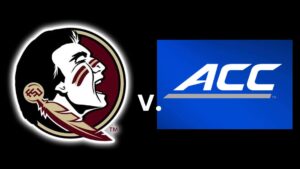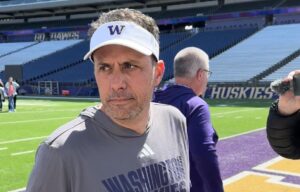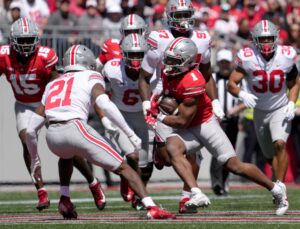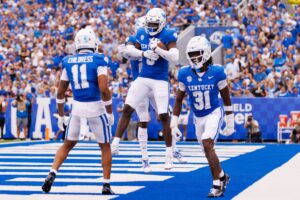When the Pac-12 says they are thinking outside the box, they take the term literally. There was NO ONE who follows the conference on a daily basis who had the name George Kliavkoff on their commissioner bingo card. Yet, the former MGM Resorts executive was announced as the conference’s new commissioner in a Thursday afternoon press conference. Since the name was plucked from relative obscurity, it was indeed everyone’s first chance to meet Commissioner Kliavkoff.
Meet Commissioner Kliavkoff
University of Oregon president Michael Schill, who headed the conference’s executive committee for the job search introduced the new commissioner. Kliavkoff has been president of entertainment and sports for MGM Resorts for three years. Prior to that he spent time with NBC Universal/Comcast, Hulu, and the WNBA board of governors. He has been the point person between the conference and Las Vegas for the Pac-12 men’s and women’s basketball tournaments, and the conference’s football championship game. That was slated to move from Santa Clara to Las Vegas last year, but that was derailed with COVID. It will be played at Allegiant Stadium in Las Vegas this December.
Kliavkoff replaces Larry Scott who had been commissioner since 2009. His contract was to go through June of next year. But in January, the conference’s executive committee, made up of the university chancellors and presidents, announced they would not be giving Scott a new contract. With that in mind, there was no sense in dragging out his tenure another year. They announced he would be leaving in June of this year, and they began the search for his replacement.
The Surprise Choice
After being introduced by Schill, Kliavkoff made the understatement of the event. “I understand that I was not on any of the media’s shortlists for this role.” In fact, no one who covers the conference or any of its schools for a living, had any inclination Kliavkoff was the choice until about an hour before the announcement. College athletics notables like Oliver Luck, and of late Andrea Williams, were always at the top of people’s lists.
Schill said the conference was, “At a crossroads,” and called Kliavkoff the, “New prototype” for conference commissioners.
Scott’s Mess
The conference is being left in a sad state of financial affairs by Scott. In 2011, Scott reached an unprecedented $3 billion tv deal for the major networks and the conference. But it was a glacier-like 12-year deal. Within three years, all of the other Power Five conferences had a better TV contract. Scott also clung to the independence of his beloved Pac-12 television network. The group of regional and network stations never fulfilled the financial promise Scott committed to the schools. First, he launched it without complete distribution. He never had clearance on DirecTV. Then when AT&T bought DirecTV, he lost AT&T as well. The lack of eyes viewing the programming created a lack of advertising revenue over the years.
Scott was given a chance to partner with ESPN three years into the product. The mega sports conglomerate would have picked up most of the operating costs in exchange for advertising revenue. Scott declined, believing independence for the network was a better path. Last Summer, amid overwhelming financial losses, the network gutted significant portions of its production and on-air staff and blamed it on COVID.
The Media Deals Are Everything…At First
Kliavkoff acknowledged the challenges of the conference’s owned and operated media property, saying there were not enough eyes watching it. The irony was not lost. He was saying that during an introductory press conference that was held on Zoom and carried exclusively on the Pac-12 Network, at the preclusion of the larger sports media broadcast outlets.
Kliavkoff said he believes there is a future for the network in the landscape of a new TV contract agreement. That new contract, with talks likely to begin in early 2023, is everything for the conference’s financial viability. Many of the schools are financially upside-down in the athletic departments. And the universities themselves are having economic woes because of COVID.
He brought up the new TV deals as one of his top three priorities when he takes over the job on July 1st. “We will make decisions to optimize revenue for our member institutions, including renegotiating our media distribution deals.”
Competition Expectations
Kliavkoff also pointed out how long it has been since a conference team has played for the national championship in football and in men’s basketball. Before you go to Google, it was 2010, when Chip Kelly’s Oregon team lost the national title game to Auburn for football. It was 2004 the last time a conference team actually won the national championship. As for basketball, the last time a conference team was in the national championship was UCLA in 2006. The last time a Pac- 12 actually won it was Arizona in 1997.
“We will do everything we can at the conference level to make our teams more competitive in revenue generating sports, especially football,” Kliavkoff said.
The Playoffs And N/I/L
Among his early initiatives he said was to push for the expansion of the college football playoffs. It is not a simple endeavor. The charter for the current format ends after the 2025 season. With the current four team format, the process is completely run by the college football playoff committee. The enterprise is owned by the FBS schools, and thus all TV and sponsorship revenue goes to the schools. The champion is not sanctioned by the NCAA. However, if the format expands beyond four teams, it becomes an NCAA sanctioned event. The NCAA would take over controlling interest of the TV negotiations, sponsorship deals, and the lion’s share of the revenue.
“Think about the fact that in almost any NCAA sport, an athlete has an 18 to 25% chance of participating in their sports post-season every year. In football, that number is 3% because of the current structure,” Kliavkoff said.
He also declared that the conference would make a strong stance in favor of athletes’ rights in the current Name/Image/Likeness movement. Several states have already put forth their own legislation on the issue. The NCAA has said it favors athletes being compensated for their N/I/L. But in reality, the NCAA is likely to sue the states that have passed legislation in order to slow down the runaway train in hopes of congress coming up with one unified national plan.
Well Kept Secret
This is the second consecutive Pac-12 commissioner who take the reigns with no major college administrative experience. Scott came from running the Women’s Tennis Association. Schill said among all the candidates, the committee was looking for someone, “who was going to set us up for the future.”
Earlier in the same press conference, Schill said the committee got more than 200 applications from around the world. “The Pac-12 commissioner job in our conference was seen as a highly coveted position,” Schill said. Be that as it may, it became very public when some qualified, and even some lesser qualified candidates withdrew their names from consideration in recent weeks. In fact, Kliavkoff said, “I was surprised to get the call.”
With so many things to fix, and much of it needing immediate attention, Kliavkoff said his first priority when moving from Las Vegas to the Bay Area will be to begin a listening and learning tour with coaches, athletic directors, and student athletes from all of the schools.
Main image courtesy Arizonasports.com






